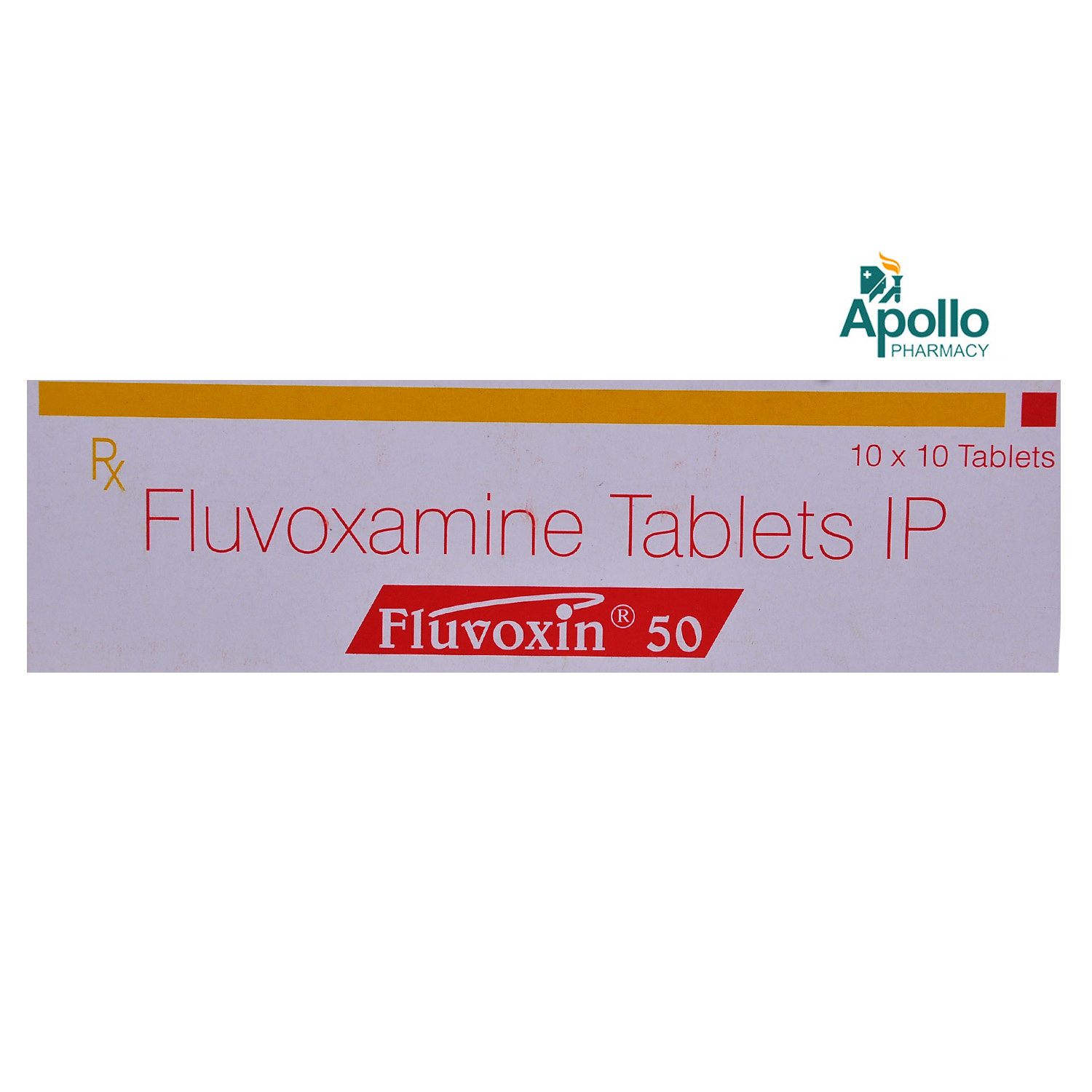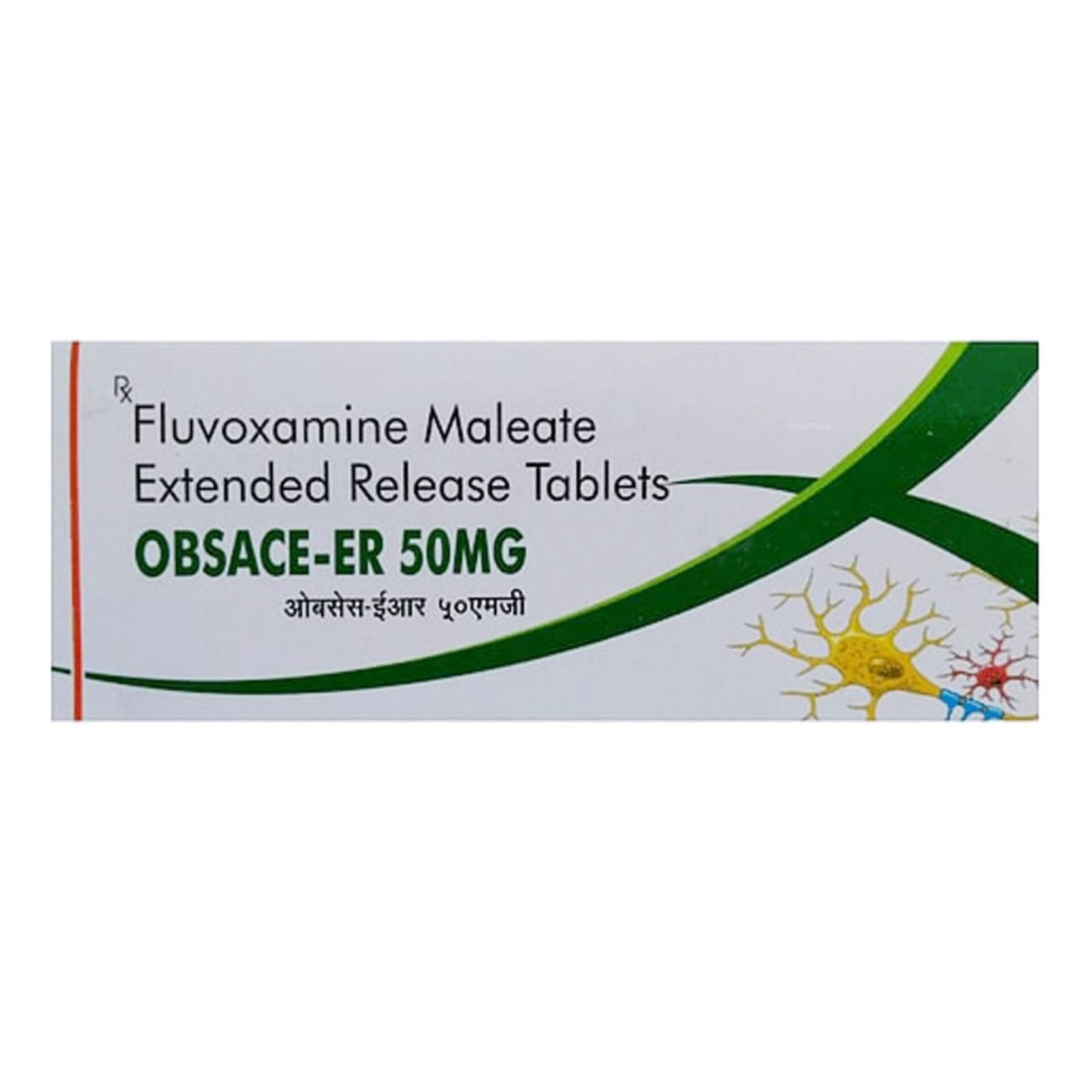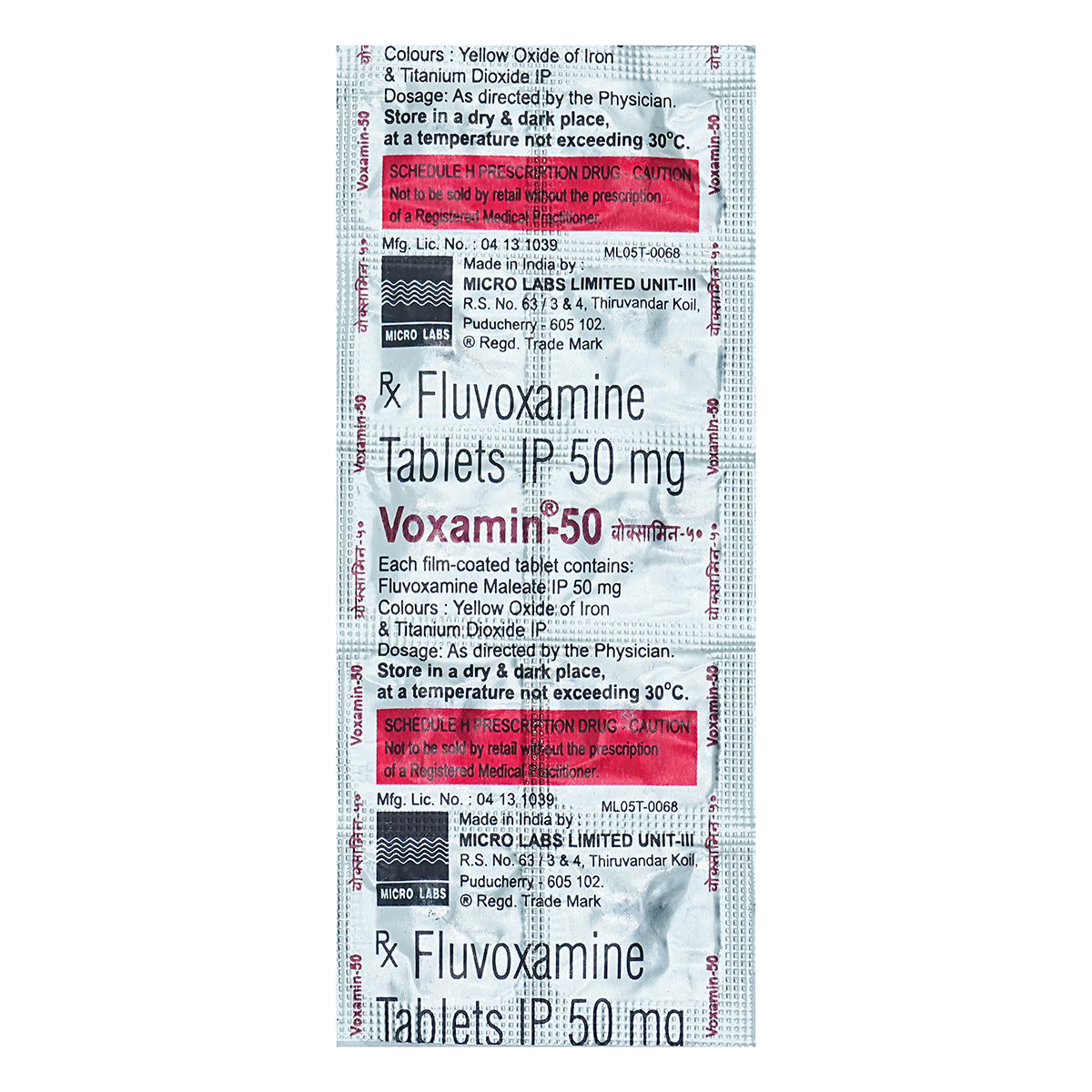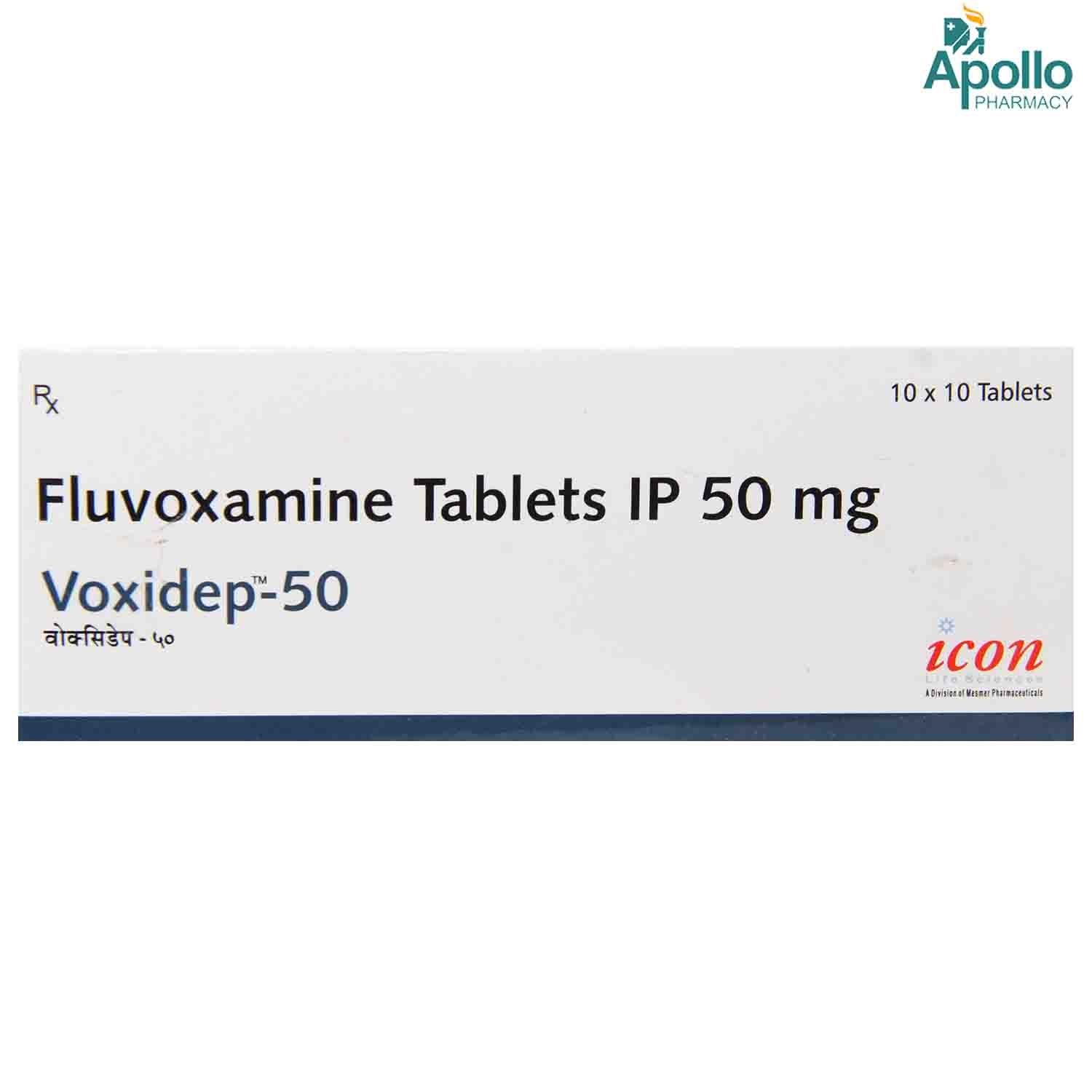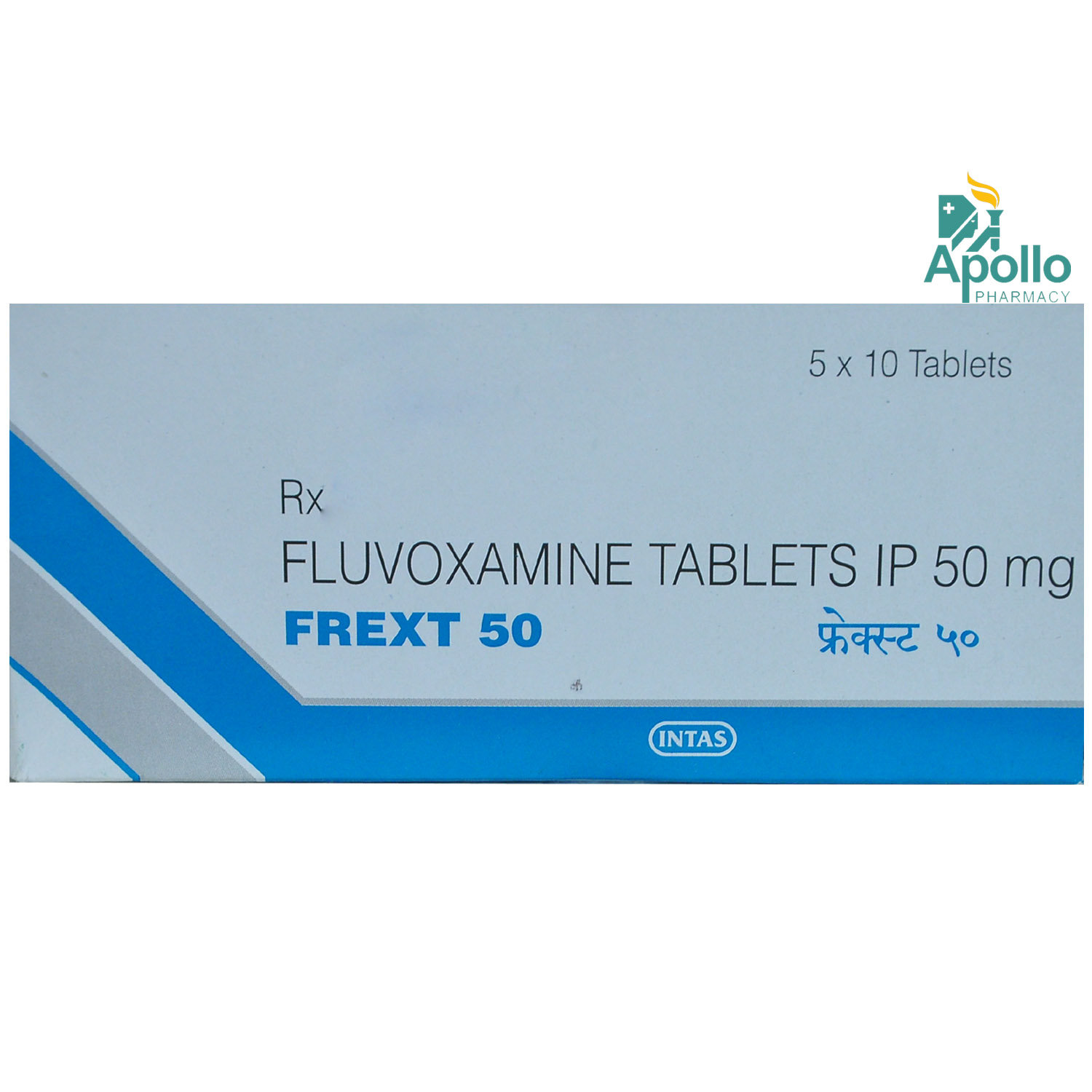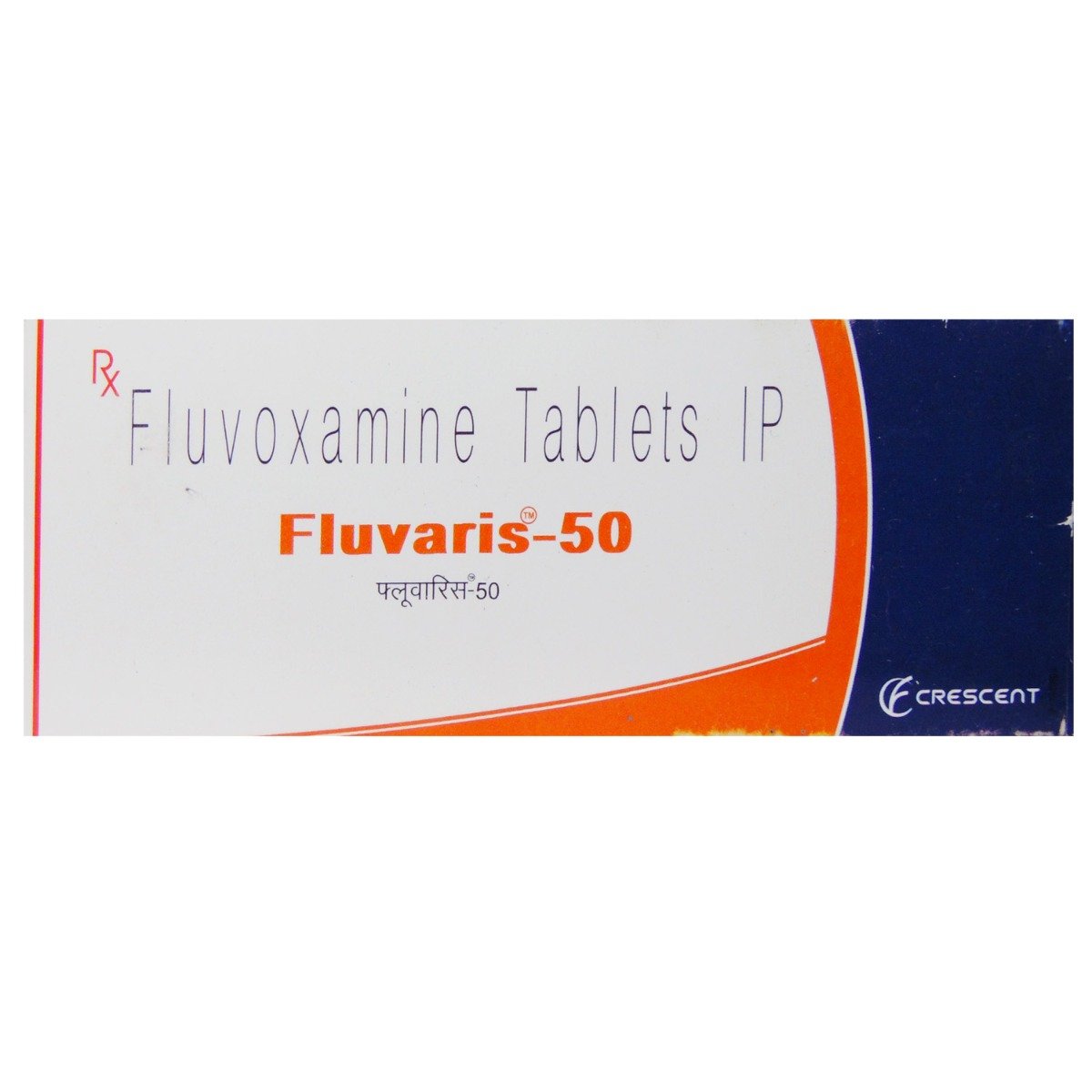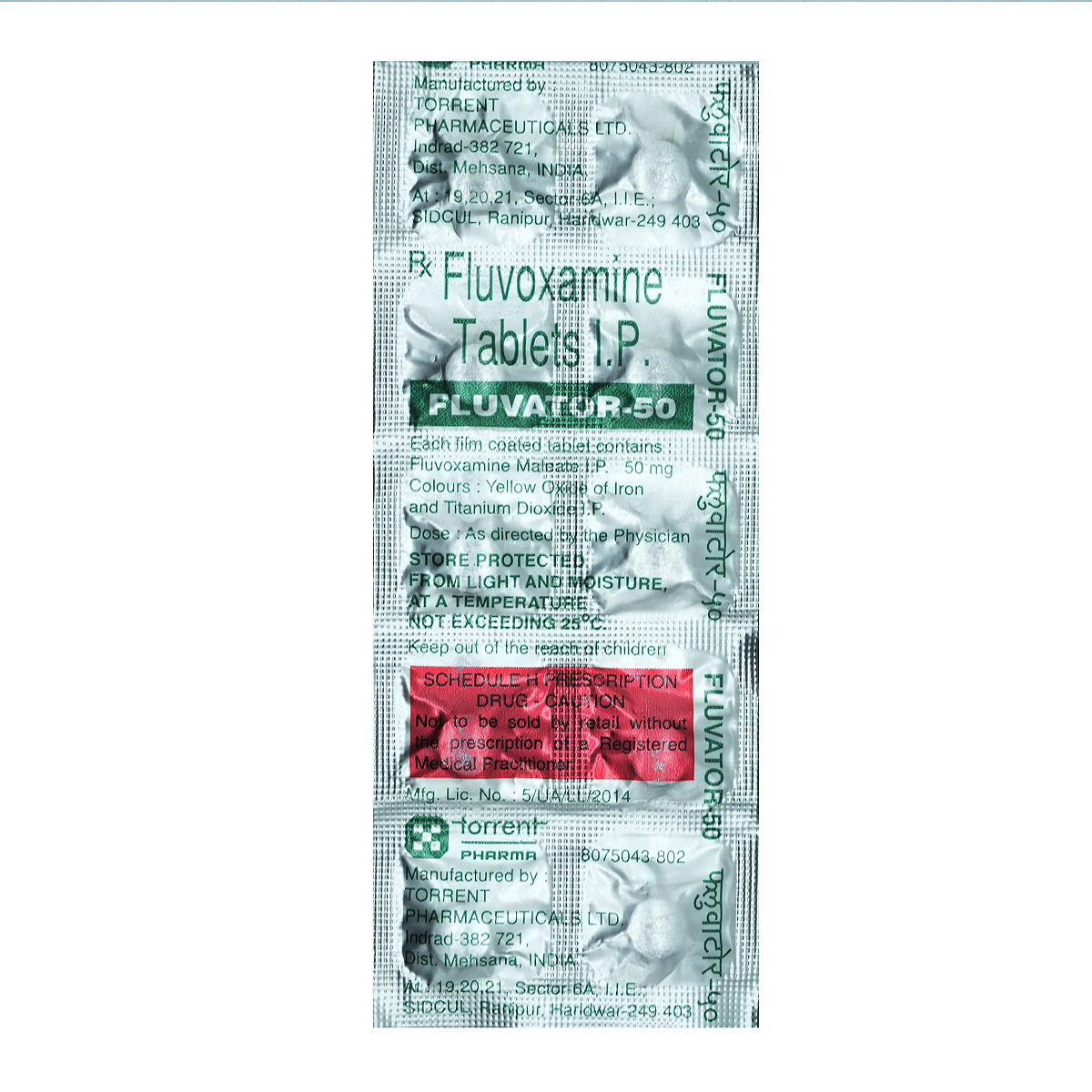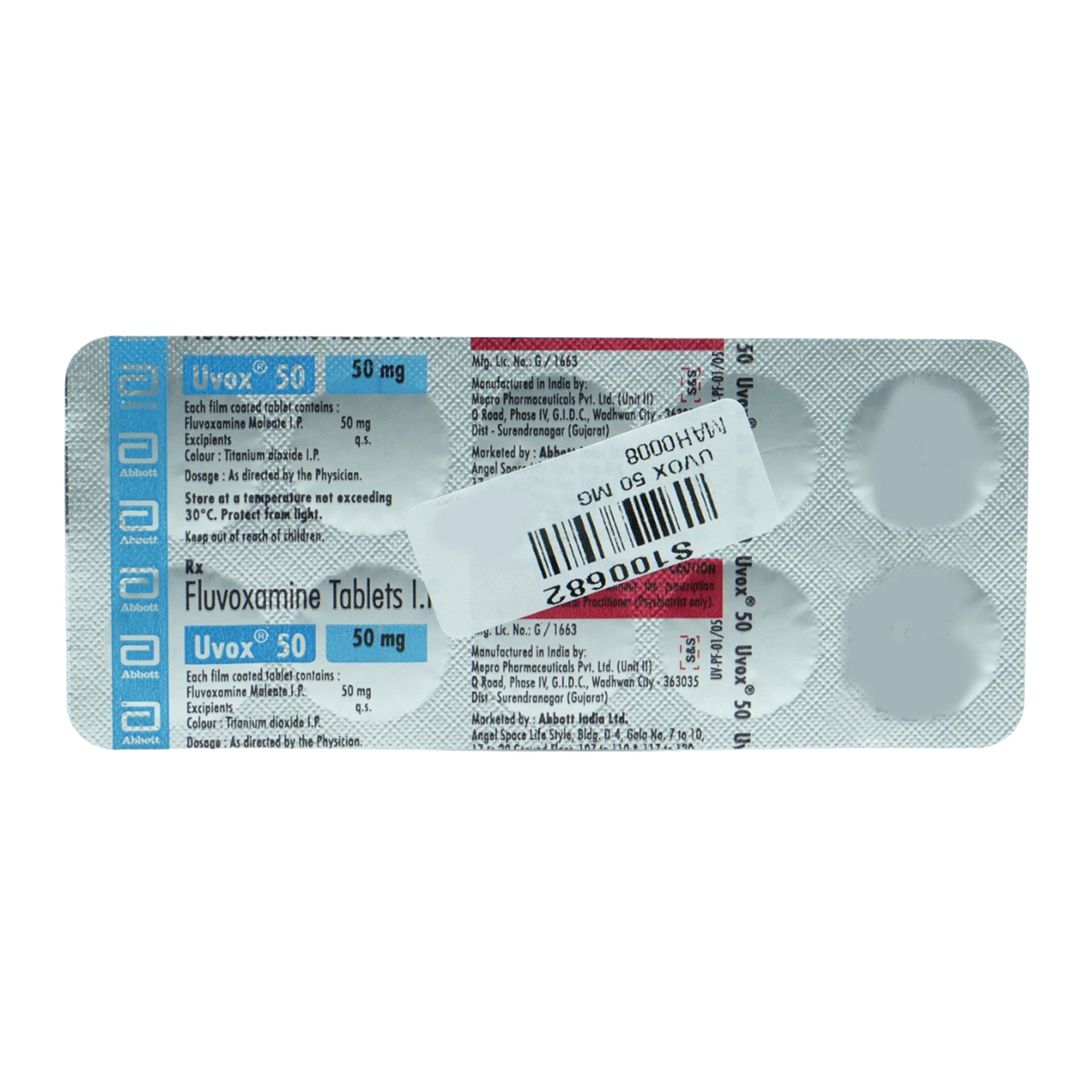Biovoxin-50 Tablet 10's
MRP ₹140
(Inclusive of all Taxes)
₹21.0 Cashback (15%)
Provide Delivery Location
Online payment accepted
 Prescription drug
Prescription drugWhats That
Composition :
Manufacturer/Marketer :
Consume Type :
Return Policy :
About Biovoxin-50 Tablet 10's
Biovoxin-50 Tablet 10's belongs to the class of medications called antidepressants. It treats neurological diseases such as depression, anxiety, panic disorder, and obsessive-compulsive disorder (OCD). Depression is a mood disorder characterized by persistent feelings of sadness, loss, or anger. Anxiety is the feeling of fear about what’s about to come. Panic disorder is characterized by a panic attack in which the patient experiences a sudden feeling of terror even if there is no real danger. Obsessive-compulsive disorder (OCD) is the excessive thoughts that lead to repetitive behaviour.
Biovoxin-50 Tablet 10's contains fluvoxamine, a selective serotonin reuptake inhibitor (SSRI). It increases the release of the serotonin hormone in the body, which is responsible for improving mood, cognition, and memory.
Take Biovoxin-50 Tablet 10's as prescribed by your doctor. Depending on your medical conditions, you are advised to take Biovoxin-50 Tablet 10's for as long as your doctor has prescribed it for you. You may experience common side effects like drowsiness, delayed ejaculation (extended period of sexual stimulation in men for releasing of sperm), erectile dysfunction, low sexual desire, insomnia (difficulty in sleeping), nausea, vomiting, restlessness, fatigue, dryness in the mouth, indigestion, loss of appetite, increased sweating, nervousness, and tremor. Most of these side effects of Biovoxin-50 Tablet 10's do not require medical attention and gradually resolve over time. However, if the side effects are persistent, reach out to your doctor.
Do not take Biovoxin-50 Tablet 10's if you are allergic (hypersensitive) to fluvoxamine or other ingredients present in this medicine. Before taking Biovoxin-50 Tablet 10's, inform your doctor if you have a low sodium level in the blood, increased risk of bleeding, suicidal thoughts, liver problems, family history of depressive disorder, intestinal ulcer (bleeding in the intestine), or glaucoma. If you are pregnant, immediately inform your doctor because Biovoxin-50 Tablet 10's may harm the unborn baby.
Uses of Biovoxin-50 Tablet 10's
Directions for Use
Key Benefits
Biovoxin-50 Tablet 10's belongs to the class of antidepressants. It is used to treat neurological diseases such as depression, anxiety, panic disorder, and obsessive-compulsive disorder (OCD). Biovoxin-50 Tablet 10's is a selective serotonin reuptake inhibitor (SSRI). It increases the release of the serotonin hormone, which balances the excitatory responses in the body. It helps in improving mood, memory, cognition, and learning. It also helps to regulate digestion, sleep cycle, and food cravings.
Storage
- Inform your doctor about the nausea and discuss possible alternatives to the medication or adjustments to the dosage.
- Divide your daily food intake into smaller, more frequent meals to reduce nausea.
- Opt for bland, easily digestible foods like crackers, toast, plain rice, bananas, and applesauce.
- Avoid certain foods that can trigger nausea, such as fatty, greasy, spicy, and smelly foods.
- Drink plenty of fluids, such as water, clear broth, or electrolyte-rich beverages like coconut water or sports drinks.
- Use ginger (tea, ale, or candies) to help relieve nausea.
- Get adequate rest and also avoid strenuous activities that can worsen nausea.
- Talk to your doctor about taking anti-nausea medication if your nausea is severe.
- Record when your nausea occurs, what triggers it, and what provides relief to help you identify patterns and manage your symptoms more effectively.
- Hydrate your body: Drink enough water to prevent dehydration and headaches.
- Calm Your Mind: Deep breathing and meditation can help you relax and relieve stress.
- Rest and Recharge: Sleep for 7-8 hours to reduce headache triggers.
- Take rest: lie down in a quiet, dark environment.
- Cold or warm compresses can help reduce tension.
- Stay Upright: Maintain good posture to keep symptoms from getting worse.
- To treat headaches naturally, try acupuncture or massage therapy.
- Over-the-counter pain relievers include acetaminophen and ibuprofen.
- Prescription Assistance: Speak with your doctor about more substantial drug alternatives.
- Severe Headaches: Seek emergency medical assistance for sudden, severe headaches.
- Frequent Headaches: If you get reoccurring headaches, consult your doctor.
- Headaches with Symptoms: Seek medical attention if your headaches include fever, disorientation, or weakness.
- Avoid driving or operating machinery or activities that require high focus until you know how the medication affects you.
- Maintain a fixed sleeping schedule, create a relaxing bedtime routine and ensure your sleeping space is comfortable to maximize your sleep quality.
- Limit alcohol and caffeine as these may worsen drowsiness and disturb sleep patterns.
- Drink plenty of water as it helps with alertness and keeps you hydrated and for overall well-being.
- Moderate physical activity can improve energy levels, but avoid intense workouts right before bedtime.
- Prepare for a restful night's sleep: Develop a calming pre-sleep routine, like reading or meditation, to help your body relax and prepare for sleep.
- Create a sleep-conducive Environment: Make bedroom a sleep haven by ensuring it is quiet, dark and calm.
- Follow a Sleep Schedule: Go to bed and get up at the same time every day to help regulate your body's internal clock and increase sleep quality.
- Try relaxing techniques like deep breathing, mindfulness meditation and any others.
- Limit stimulating activities before bedtime: Avoid stimulating activities before bedtime to improve sleep quality.
- Monitor Progress: Keep track of your sleep patterns to identify areas for improvement.
- Consult a doctor if needed: If these steps don't improve your sleep, consult a doctor for further guidance and therapy.
- Inform Your Doctor: Notify your doctor immediately about your diarrhoea symptoms. This allows them to adjust your medication or provide guidance on managing side effects.
- Stay Hydrated: Drink plenty of fluids to replace lost water and electrolytes. Choose water, clear broth, and electrolyte-rich drinks. Avoid carbonated or caffeinated beverages to effectively rehydrate your body.
- Follow a Bland Diet: Eat easy-to-digest foods to help firm up your stool and settle your stomach. Try incorporating bananas, rice, applesauce, toast, plain crackers, and boiled vegetables into your diet.
- Avoid Trigger Foods: Steer clear of foods that can worsen diarrhoea, such as spicy, fatty, or greasy foods, high-fibre foods, and dairy products (especially if you're lactose intolerant).
- Practice Good Hygiene: Maintain good hygiene to prevent the spread of infection. To stay healthy, wash your hands frequently, clean and disinfect surfaces regularly, and avoid exchanging personal belongings with others.
- Take Anti-Diarrheal Medications: If your doctor advises, anti-diarrheal medications such as loperamide might help manage diarrhoea symptoms. Always follow your doctor's directions.
- Keep track of your diarrhoea symptoms. If they don't get better or worse or are accompanied by severe stomach pain, blood, or dehydration signs (like extreme thirst or dark urine), seek medical help.
- Inform your doctor about dizziness symptoms. They may adjust your medication regimen or prescribe additional medications to manage symptoms.
- Follow your doctor's instructions for taking medication, and take it at the same time every day to minimize dizziness.
- When standing up, do so slowly and carefully to avoid sudden dizziness.
- Avoid making sudden movements, such as turning or bending quickly, which can exacerbate dizziness.
- Drink plenty of water throughout the day to stay hydrated and help alleviate dizziness symptoms.
- If you're feeling dizzy, sit or lie down and rest until the dizziness passes.
- Track when dizziness occurs and any factors that may trigger it, and share this information with your doctor to help manage symptoms.
Drug Warnings
Do not take Biovoxin-50 Tablet 10's if you are allergic (hypersensitive) to fluvoxamine or other ingredients present in this medicine. Before taking Biovoxin-50 Tablet 10's, inform your doctor if you have low sodium level in the blood, increased risk of bleeding, suicidal thoughts, liver problems, kidney problems, family history of depressive disorder, intestinal ulcer (bleeding in the intestine), and glaucoma. If you are pregnant, then immediately inform your doctor because Biovoxin-50 Tablet 10's may harm the unborn baby. Talk to your doctor if you are a breastfeeding mother. Do not take alcohol because alcohol makes you dizzier and drowsier. Talk to your doctor if you are using alcohol.
Drug-Drug Interactions
Drug-Drug Interactions
Login/Sign Up
Taking Biovoxin-50 Tablet with Tizanidine it can increases the risk of side effects.
How to manage the interaction:
Although Biovoxin-50 Tablet with Tizanidine is not recommended, but can be taken together if prescribed by a doctor. However, if you experience drowsiness, dizziness, low blood pressure, slurred speech, confusion, or severe weakness, contact your doctor immediately. Do not stop using any medications without consulting a doctor.
Taking Furazolidone with Biovoxin-50 Tablet can increase the risk of serotonin syndrome(A condition in which a chemical called serotonin increase in your body).
How to manage the interaction:
Taking Biovoxin-50 Tablet with Furazolidone is not recommended, but can be taken if prescribed by a doctor. However, if you experience confusion, hallucination, seizure, extreme changes in blood pressure, increased heart rate, fever, excessive sweating, shivering or shaking, blurred vision, muscle spasm or stiffness, tremor, incoordination, stomach cramp, nausea, vomiting, and diarrhea contact your doctor immediately. Do not discontinue any medications without consulting a doctor.
Taking thioridazine with Biovoxin-50 Tablet may significantly increase the blood levels of thioridazine and cause an irregular heart rhythm
How to manage the interaction:
Although Biovoxin-50 Tablet with Thioridazine is not recommended, but can be taken together if prescribed by a doctor. However, if you experience sudden dizziness, lightheadedness, fainting, shortness of breath contact your doctor immediately. Do not stop using any medications without consulting a doctor.
When Citalopram is taken with Biovoxin-50 Tablet it increase the blood levels of citalopram and also increase the risk of certain side effects, including an irregular heart rhythm
How to manage the interaction:
Taking Biovoxin-50 Tablet with Citalopram is not recommended, but can be taken if prescribed by a doctor. However, if you experience dizziness, lightheadedness, fainting, shortness of breath, or fast heartbeats please contact your doctor immediately. Do not discontinue any medications without consulting a doctor.
Taking Phenelzine with Biovoxin-50 Tablet can increase the risk of serotonin syndrome(a condition in which a chemical called serotonin increase in your body).
How to manage the interaction:
Taking Biovoxin-50 Tablet with Phenelzine is not recommended, but can be taken together if prescribed by a doctor. However, if you experience confusion, hallucination(seeing & hearing things that do not exist), seizure(fits), extreme changes in blood pressure, increased heart rate, fever, excessive sweating, shivering or shaking, blurred vision, muscle spasm or stiffness, tremor(shaking of hands & legs), incoordination, stomach cramp, nausea, vomiting, and diarrhea. Do not discontinue any medication without consulting a doctor.
Taking Biovoxin-50 Tablet with tranylcypromine can increases the risk of serotonin syndrome(a condition in which a chemical called serotonin increase in your body).
How to manage the interaction:
Although there is a possible interaction between Biovoxin-50 Tablet and Tranylcypromine, it can be taken together if prescribed by a doctor. However, consult a doctor if you experience confusion, hallucination(seeing and hearing things that do not exist), increased heart rate, fever, excessive sweating, shivering or shaking, blurred vision, pain in the muscles or stiffness, incoordination, stomach cramps, nausea, vomiting, and diarrhea. Do not discontinue any medications without consulting your doctor.
Taking Ramelteon with Biovoxin-50 Tablet can increases the blood levels of ramelteon.
How to manage the interaction:
Taking Ramelteon with Biovoxin-50 Tablet is not recommended, but can be taken together if prescribed by a doctor. However, if you experience any unusual symptoms contact your doctor immediately. Do not discontinue any medication without consulting a doctor.
Taking Biovoxin-50 Tablet with Methylene blue can increase the risk of serotonin syndrome(a condition in which a chemical called serotonin increases in your body).
How to manage the interaction:
Taking Biovoxin-50 Tablet with Methylene blue is not recommended, but can be taken together if prescribed by a doctor. However, if you experience confusion, hallucination(seeing & hearing things that do not exist), seizure(fits), increased heart rate, fever, excessive sweating, shivering or shaking, blurred vision, muscle spasm or stiffness, tremor(shaking of hands & legs), incoordination, stomach cramp, nausea, vomiting, and diarrhea. Do not discontinue any medication without consulting a doctor.
Taking Biovoxin-50 Tablet with isocarboxazid can increase the risk of serotonin syndrome(a condition in which a chemical called serotonin increase in your body).
How to manage the interaction:
Taking Isocarboxazid with Biovoxin-50 Tablet is not recommended, but can be taken together if prescribed by a doctor. However, if you experience confusion, hallucination(seeing & hearing things that do not exist), seizure(fits), extreme changes in blood pressure, increased heart rate, fever, excessive sweating, shivering or shaking, blurred vision, muscle spasm or stiffness, tremor(shaking of hands & legs), incoordination, stomach cramp, nausea, vomiting, and diarrhea
Coadministration of Biovoxin-50 Tablet with Metoclopramide increases the risk of serotonin syndrome(a condition in which a chemical called serotonin increases in your body).
How to manage the interaction:
Taking Biovoxin-50 Tablet with Metoclopramide is not recommended, as it can lead to an interaction, it can be taken if prescribed by your doctor. Do not stop using any medications without a doctor’s advice.
Drug-Food Interactions
Drug-Food Interactions
Login/Sign Up
Diet & Lifestyle Advise
- Eat a well-balanced diet.
- Avoid processed or packed foods and foods that are high in refined sugars.
- Exercise regularly.
- Lose excess weight and keep a check on your weight.
- Avoid stress.
- Improve your mood by being active, socializing with others, and talking about your feelings.
- Quit alcohol intake and smoking.
Side Effects of Biovoxin-50 Tablet 10's
- Drowsiness
- Delayed ejaculation (extended period of sexual stimulation in men for releasing of sperm)
- Erectile dysfunction
- Low sexual desire
- Insomnia (difficulty in sleeping)
- Nausea
- Vomiting
- Restlessness
- Fatigue
- Dryness in the mouth,
- Indigestion
- Loss of appetite
- Increased sweating
- Nervousness
- Tremor
- Decreased sodium levels
Habit Forming
Therapeutic Class
All Substitutes & Brand Comparisons
RX
Fmine 50 Tablet 10's
Aspen Pharmaceutical Pvt Ltd
₹133
(₹11.97 per unit)
14% CHEAPERRX
Voxaday 50 mg Tablet 10's
Sigmund Promedica
₹154.5
(₹13.91 per unit)
RX
Out of StockCERERest 50mg Tablet 10's
Med Manor Organics Pvt Ltd
₹157
(₹14.13 per unit)
Drug-Diseases Interactions
Drug-Diseases Interactions
Login/Sign Up
FAQs
Drug-Drug Interactions Checker List
- CLOPIDOGREL
- WARFARIN
- ASPIRIN
- TRAMADOL
- MEXILETINE
- METHADONE
- PHENYTOIN
- CARBAMAZEPINE
- PROPRANOLOL
- ROPINIROLE
- SUMATRIPTAN
- THEOPHYLLINE
Special Advise
Disease/Condition Glossary
Depression: Depression is a mental health disorder in which patients experience persistent loss of interest or mood and feelings of sadness. It affects the quality of life. It causes changes in sleep, appetite, social behaviour, learning abilities, concentration, and self-esteem.
Anxiety: Anxiety is a feeling of fear, worry, or uneasiness. It is usually a normal emotion. However, the condition is called anxiety disorder if a person experiences repeated episodes of anxiety that worsen over time or interfere with daily activities.
Panic disorder: Panic disorder is a type of anxiety disorder. It is characterized by sudden panic attacks in which patients experience intense fear even if there is no danger.
Obsessive-compulsive disorder (OCD): As the name suggests, patients experience obsessions (intruding excessive thoughts) that cause compulsions (impulsive behaviours). It is characterized by nervousness, repetitive movements or words, and increased alertness.

Have a query?
Alcohol
Safe if prescribed
Biovoxin-50 Tablet 10's interacts with alcohol and increases the risk of side-effects like sleepiness and dizziness.
Pregnancy
Consult your doctor
Biovoxin-50 Tablet 10's should not be used when pregnancy unless clearly necessary. So, inform your doctor if you are pregnant or suspect pregnancy. Your doctor will weigh the benefits and potential risks before prescribing Biovoxin-50 Tablet 10's.
Breast Feeding
Consult your doctor
Biovoxin-50 Tablet 10's should not be used in nursing mothers unless clearly necessary. So, inform your doctor if you are a nursing mother. Your doctor will weigh the benefits and potential risks before prescribing Biovoxin-50 Tablet 10's.
Driving
Safe if prescribed
Biovoxin-50 Tablet 10's causes drowsiness. So, it is recommended to avoid driving or operating heavy machinery after taking Biovoxin-50 Tablet 10's.
Liver
Consult your doctor
Biovoxin-50 Tablet 10's to be taken with caution, especially if you have a history of liver diseases/conditions. The dose may have to be adjusted by your doctor.
Kidney
Consult your doctor
Biovoxin-50 Tablet 10's to be taken with caution, especially if you have a history of kidney diseases/conditions as dose adjustment might be required.
Children
Safe if prescribed
Biovoxin-50 Tablet 10's is not recommended for use in children because it may cause loss of appetite and weight loss.






